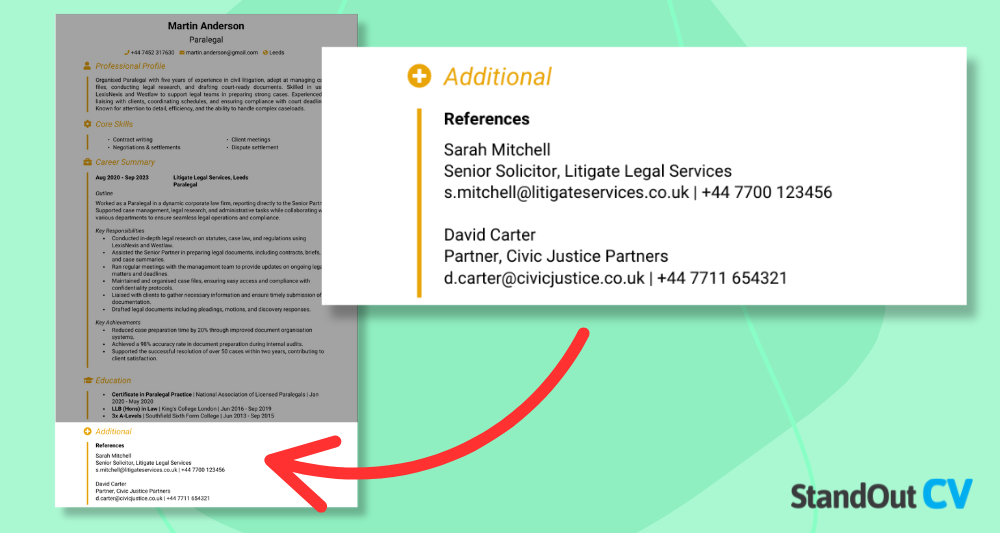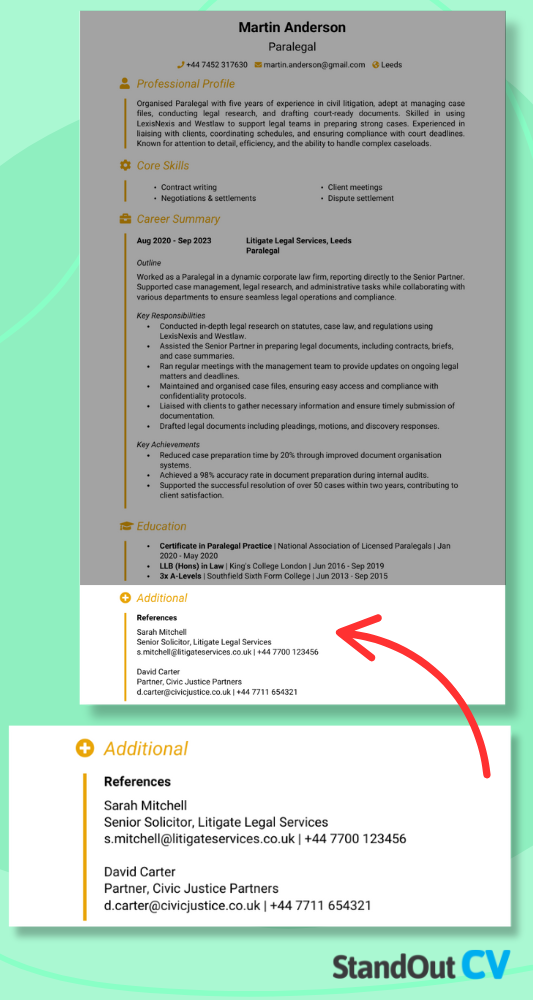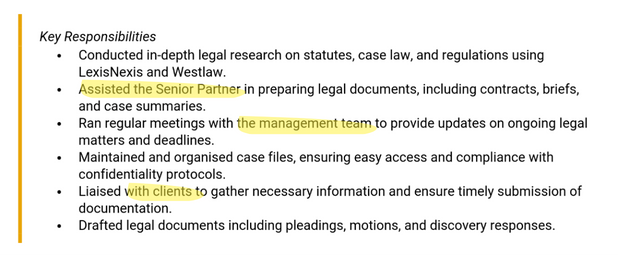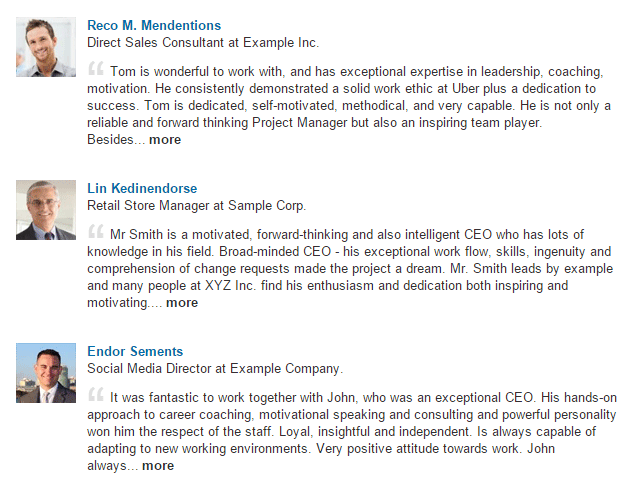References are something candidates ask me about all the time – should they go on the CV or not?
The truth is, you don’t need to include reference in your CV every time you apply for a job, but there are some situations where it can be beneficial.
This guide will break down whether you should list CV references, how to do it the smart way, and what you can use instead to give your CV more impact
Should you add references to your CV?
Generally speaking, you really don’t need to add references to your CV.
Recruiters typically don’t request them until after they’ve made a job offer, so using valuable CV space for unnecessary details isn’t the best choice. Instead, use it to showcase your skills and experience – the things that actually land you the interview.
That said, there are exceptions. If the job advert specifically asks for references upfront, or if you’ve got an exceptional reference that could really strengthen your application, it might make sense to include them. If you’re set on writing in references, there’s a right way to do it.
How do you write references on a CV?
It’s important to present your referees’ details clearly so recruiters can quickly understand their role and contact them without confusion. Here’s how to structure each reference:
- Full name – Provide their name and title.
- Job title and organisation – Mention their role and the company they work for, as it adds credibility.
- Contact details – Include their preferred email address and phone number – make sure these are up-to-date.
- Your relationship: Briefly note your connection, such as “Former Manager” in a previous role or “University Tutor” during your degree.
When it comes to their contact details, only add what you’ve already got explicit permission for. Not only is it common courtesy, it’ll give them a heads-up so they’re ready to take that all-important call or email.
CV reference example
References
Jane Williams
Marketing Manager at Bright Ideas Agency
Email: jane.williams@brightideas.com
Phone: +44 7700 900123
Relationship: Line Manager
Dr. Alan Spencer
Senior Lecturer at University College London
Email: a.spencer@ucl.ac.uk
Phone: +44 20 7946 0123
Relationship: Former University Tutor
Peter Davies
Team Leader at Apex Retail Solutions
Email: petedavies@apexretail.co.uk
Phone: +44 7540 320456
Relationship: Former Supervisor
Where to put references on your CV
If you’re including references, keep them at the very bottom of your CV, after all your other key sections like work experience and education.
Keep the section short and simple – don’t let it take up valuable space that could be used to show off your skills or achievements. A well-placed reference section with a minimal format should complement your CV, not compete with it.




How to ask for a reference
Reaching out for a reference might feel a bit daunting, especially if it’s been a while since you had the job (or if you quit it find this new one…).
But it’s much easier than you think: most people are happy to help, and a polite and professional approach makes all the difference.
Whether you’re dropping them a message on LinkedIn or sending an email, here are some tips on the general layout to do it right:
- Start with their name – Addressing it personally makes your request feel genuine and respectful.
- Be polite – Let them know you’re applying for a role and would love their support as a reference.
- Make it easy – Provide them with details on the roles so they can best tailor their reference.
- Offer something in return – Suggest returning the favour, or something as simple as buying them a coffee – small gestures go a long way.
- Thank them in advance – Always show your gratitude upfront, whether they agree or not – it leaves the door open for future opportunities.
Reference request email template
Subject: Reference request
Hi [first name],
I hope this message finds you well. I’m reaching out because I’m currently applying for [specific job title] at [company name], and I was wondering if you’d feel comfortable providing a reference for me.
Having worked with you at [company name], I believe your insight would be incredibly valuable.
To make things easier, I’d be happy to share details about the role or provide a summary of my CV if that would help. I’d also be more than happy to return the favour in the future or treat you to a coffee sometime!
Thank you so much for considering this – your help would be deeply appreciated. Please let me know if you’d be happy to help or if there’s anything else you need from me.
Best regards,
[Your name]
Why you shouldn’t put references on your CV
Including references on your CV might seem like the obvious thing to do, and it’s one of the more common CV mistakes people make.
Here are three key reasons why leaving them off is the smarter choice.
They’re not needed yet
Sending off your CV occurs pretty early on in the recruitment process. It’s still a little while before the job offers come rolling in, and most recruiters won’t reach out to your referees until they’re ready to make an offer. At this point in the process, their interest is in your skills and experience.
And let’s face it – you don’t want your boss knowing that you’re job hunting until there’s something solid on the table. Recruiters understand this, so there’s an unspoken agreement that a candidate can’t provide a reference until they’ve got a job offer already.
Wondering whether to add references to your CV?
With our CV builder, you’ll get expert advice, structured templates, and pre-written content to help you format your CV professionally and efficiently.
They put your referees’ information at risk
Sharing references on your CV means putting someone else’s personal details – their name, job title, email, and phone number – into the wild.
Once your CV is sent out, there’s no telling where it might end up. It could be forwarded, uploaded to job boards, or even stored in databases, leaving your referee’s private information at the mercy of the internet.
This isn’t just a bad look; it could also damage your relationship with your referees. They’ve agreed to vouch for you, not have their inbox bombarded by random companies or spam.
They waste space
With only 1-2 pages in length to impress recruiters, every line of your CV needs to work hard. Including references takes up valuable real estate that could be better used to showcase your sought-after skills, achievements, and experience – things that’ll actually convince employers to pick up the phone.


What to put on your CV instead of references
You might be worried that without references, there’s nothing to prove that you’re the stellar candidate you say you are. But there are a number of other ways to convey the value you provided past employers.
Mention who you reported to
Dropping in details about who you reported to will say a lot about your seniority and the kind of relationships you built within the organisation.
You can easily weave these details throughout your work experience section. In your job outlines, note details like reporting directly to department heads, managers, or senior executives:

You can also note any interactions with these individuals in your responsibilities, outlining the close interactions you had with them:

Quantify your achievements
No doubt, your CV contains an impressive list of achievements: but you can really make them count by backing them up with some figures.
Whether you “increased sales by 20%”, “managed a team of 10”, or “delivered a project three weeks ahead of schedule”, numbers give recruiters a clear picture of the impact you’ve made without needing a third party to back you up.
Focus on achievements that benefited the company. While promotions and awards are impressive, the key is to highlight how your efforts contributed to the organisation’s success.

Discuss your impact
You should also use your role descriptions to show the difference you’ve made in your workplace. Your impact is the result of your actions – if your job was to improve processes, your impact was saved time and money.
Don’t just list your responsibilities – show how they made a difference. Instead of saying your duties included “Making outbound calls to potential clients”, detail how you were “Making outbound calls to potential clients to generate quality leads for the sales team to convert to orders”.
This approach instantly shows recruiters the tangible value you bring, making it easier for them to see why you’re the perfect hire.
Have your references available upon request
You may worry that by not listing any references, you’re implying that you don’t have any good ones. No recruiter would think that that’s the case, but if you feel the need to prove that you’re prepared to provide references if and when they’re needed, you can simply say that “References are available upon request”.
Of course, make sure your references actually are available upon request – be sure to seek permission from your referees well ahead of time.
Get recommendations on LinkedIn
Upwards of 95% of recruiters make regular use of LinkedIn. It’s a popular source to find and screen candidates – so there are good odds that recruiters will end up looking at your profile.
Having past colleagues – especially senior figures – leave positive testimonials on your profile would definitely be seen by prospective employers. Reach out to your colleagues and politely ask for a recommendation, while offering to return the favour.

FAQs
Who should you put as a reference?
It depends on your career stage – professionals should choose former managers or colleagues who can vouch for their skills, while graduates or juniors can use tutors or internship supervisors.
Avoid outdated references from long-forgotten roles, and steer clear of personal references (like your friends and family) unless explicitly requested.
How many references do you need on a CV?
You usually need 2-3 references, but the exact number can vary depending on the role. Some positions may ask for more, especially senior or specialised roles, so always check the job requirements.
Do you need references on a CV?
No, you don’t need to include references on your CV unless specifically requested. However, you should have a few ready to provide later in the hiring process when you’re asked, and you’re free to include them if you prefer.



